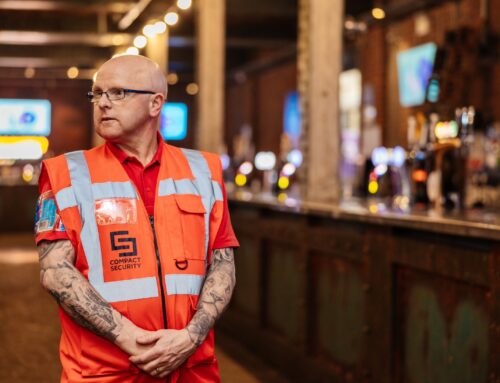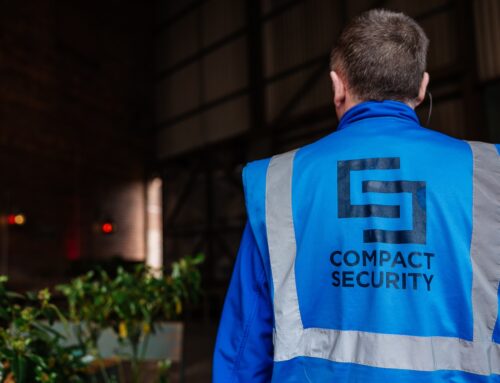In the world of events and security you’ll frequently hear the term “SIA licensing” mentioned, and for good reason. The Security Industry Authority (SIA) is the organisation responsible for regulating the private security industry, a body established by the government to oversee the implementation of the Private Security Industry Act 2001. SIA licensing is a compulsory requirement for individuals working in various sectors of private security and this article delves into what SIA licensing means and its significance in the industry.
Understanding SIA Licensing
SIA licensing is a mechanism of accountability and standardisation within the private security sector. It serves as a testament to the qualification, reliability, and professionalism of individuals within the field and ensures that a level of ethics and standards are met. To obtain a licence, an individual must undergo a rigorous process that includes identity checks, criminal record checks, and the completion of accredited training courses.
The SIA offers different types of licences, each tailored to a specific role within the security industry, such as door supervision, security guarding, close protection, public space surveillance (CCTV), and key holding, among others. The process of obtaining a licence is stringent; it is designed to ensure that those entering the field are capable of upholding the high standards expected by both the law and the communities they serve.
The Significance of SIA Licensing
Public Safety & Trust
The primary significance of SIA licensing lies in its contribution to public safety. By ensuring that only those with the appropriate background, training, and disposition are given responsibilities over public or private safety, the SIA licensing system helps maintain trust in the security sector. Licence holders are perceived as trusted professionals, which is crucial for their role in situations that may involve risk or require the use of force. It’s also important as they may find themselves interacting with vulnerable individuals.
Quality Assurance:
SIA licensing acts as a quality benchmark. Companies that hire licensed personnel are assured that their employees meet a national standard of performance and knowledge. This assurance is indispensable in sectors where the margin for error is minimal and the consequences of failure can be severe. Whilst of course an SIA licence is not a guarantee of someone’s character or ability, it does provide a base level of assurance, and also means that individuals working in these security roles are easily identifiable and accountable for their actions.
Professional Development:
For security personnel, the process of acquiring an SIA licence is not just a legal requirement but also a professional milestone. It is evidence of their commitment to their role and their preparedness to perform their duties effectively. Ongoing training is required to maintain the licence, which promotes continual professional development and ensures that security personnel are up-to-date with the latest practices and legislation.
Crime Prevention and Deterrence:
Licensed SIA security operatives are often the first line of defence against criminals and ‘bad actors’. They play a vital role in the prevention and deterrence of criminal activities, from theft and vandalism, to violent crimes and sometimes more serious offences. The training mandated by the SIA ensures that licence holders are equipped with the skills to not only respond to criminal acts but also help to anticipate risks and mitigate them.
Legal Compliance:
Operating without an SIA licence in a licensable role is illegal and the police and local authorities regularly make checks to detect non-compliance and enforce the law. This legal requirement underscores the significance of the licensing system in enforcing standards across the industry. The potential penalties for non-compliance, including fines and imprisonment, further emphasise the importance of the licensing system and provide it with additional kudos and credence.
Consumer Confidence:
When an organisation hires SIA-licensed personnel, it communicates to its customers that it values their safety and is committed to providing a secure environment. This can be a decisive factor for customers when choosing a service, particularly in sectors where security is a primary concern, such as event management or retail. The investment in SIA licensed personnel is a clear message to consumers and criminals alike, demonstrating an organisation’s determination and dedication to its customers and other stakeholders.
Uniformity Across the Industry:
The SIA licensing creates a level playing field within the security industry. It standardised what would otherwise be a diverse and fragmented sector, with different companies potentially upholding varying standards. Uniformity ensures that regardless of the employer, licensed security staff have met the same basic criteria.
The Licensing Process
The licensing process itself is designed to assess and validate the suitability of an individual for a role in security. It typically involves the following steps:
- Eligibility Check: The applicant must be over 18 and have the right to work in the UK.
- Identity and Criminal Record Checks: This ensures the applicant has no disqualifying criminal history.
- Qualifications: The applicant must have completed an approved training course relevant to the type of licence they are applying for.
- Application Submission: The individual submits their application to the SIA, along with the necessary documentation and fees.
- Assessment: The SIA assesses the application against their criteria.
- Issuance: If successful, the individual is issued an SIA licence, which is valid for three years.
Continued Importance
The need for SIA licensing is not static; it evolves with societal changes and technological advancements. As the security landscape shifts—be it due to changes in crime patterns, the introduction of new technologies, or the aftermath of significant events—the SIA’s licensing requirements may also change. This adaptability is key to the ongoing relevance and importance of the licensing system.
The Ongoing Evolution of SIA Licensing
The adaptability of the SIA licensing requirements is crucial as it reflects the dynamic nature of security risks. For instance, with the increasing threat of cybercrime, even physical security personnel need to be aware of digital vulnerabilities. The SIA’s commitment to evolving its licensing standards is an acknowledgment of such shifting paradigms, ensuring that the industry’s personnel remain capable of addressing contemporary challenges.
Impact on the Security Workforce
For individuals working in the security sector, SIA licensing is often seen as a career enhancer. It opens doors to a variety of roles and sectors that would otherwise be inaccessible. Not only that, it provides a framework for career progression, with different types of licences and levels of accreditation acknowledging different skills and specialisations.
The Role of Employers
Employers in the security sector play a crucial role in the SIA licensing process. It is their responsibility to ensure that their staff is properly licensed and to support their employees in obtaining and maintaining their licences. By investing in licensed staff, employers not only comply with the law but also enhance their service quality and reputation.
Challenges and Criticisms
Despite its importance, the SIA licensing system is not without its challenges and criticisms. Some argue that the system can be bureaucratic and the cost of licensing can be a barrier for individuals entering the industry. There is also an ongoing discussion about the breadth of roles requiring licensing, with some advocating for a more expansive approach to include emerging security roles, while others call for a more streamlined, less burdensome process.
The Future of SIA Licensing
Looking forward, the SIA is likely to continue adapting its licensing framework to meet the evolving needs of the security industry and the ever changing nature of threats that its operatives and wider society face. This may involve the incorporation of more advanced training modules, such as counter-terrorism awareness or cyber security protocols, and a more streamlined application process utilising digital technologies.
Conclusion
SIA licensing is much more than just a regulatory requirement; it is a cornerstone of professional security practice in the UK. It provides a base level of quality and safety to the public and a framework of professional development for the security workforce. While the system may evolve, its core objective remains steadfast: to maintain and enhance the standards of those entrusted with the vital role of protecting people, properties, and assets. The significance of SIA licensing in upholding these standards cannot be overstated, and it will continue to be a defining feature of the UK’s security industry for the foreseeable future.
Compact Security invests heavily in the development of our people and processes, in line with, and above the standards set by the SIA. This is demonstrated by our ‘SIA Approved Contractor’ accreditation, which is given to a select number of organisations who have distinguished themselves as being amongst the best providers of private security services in the UK. Our sister company, Raw Training & Security, support this ongoing effort by providing reliable, robust and accessible SIA License training, accredited by Highfields Qualifications.





